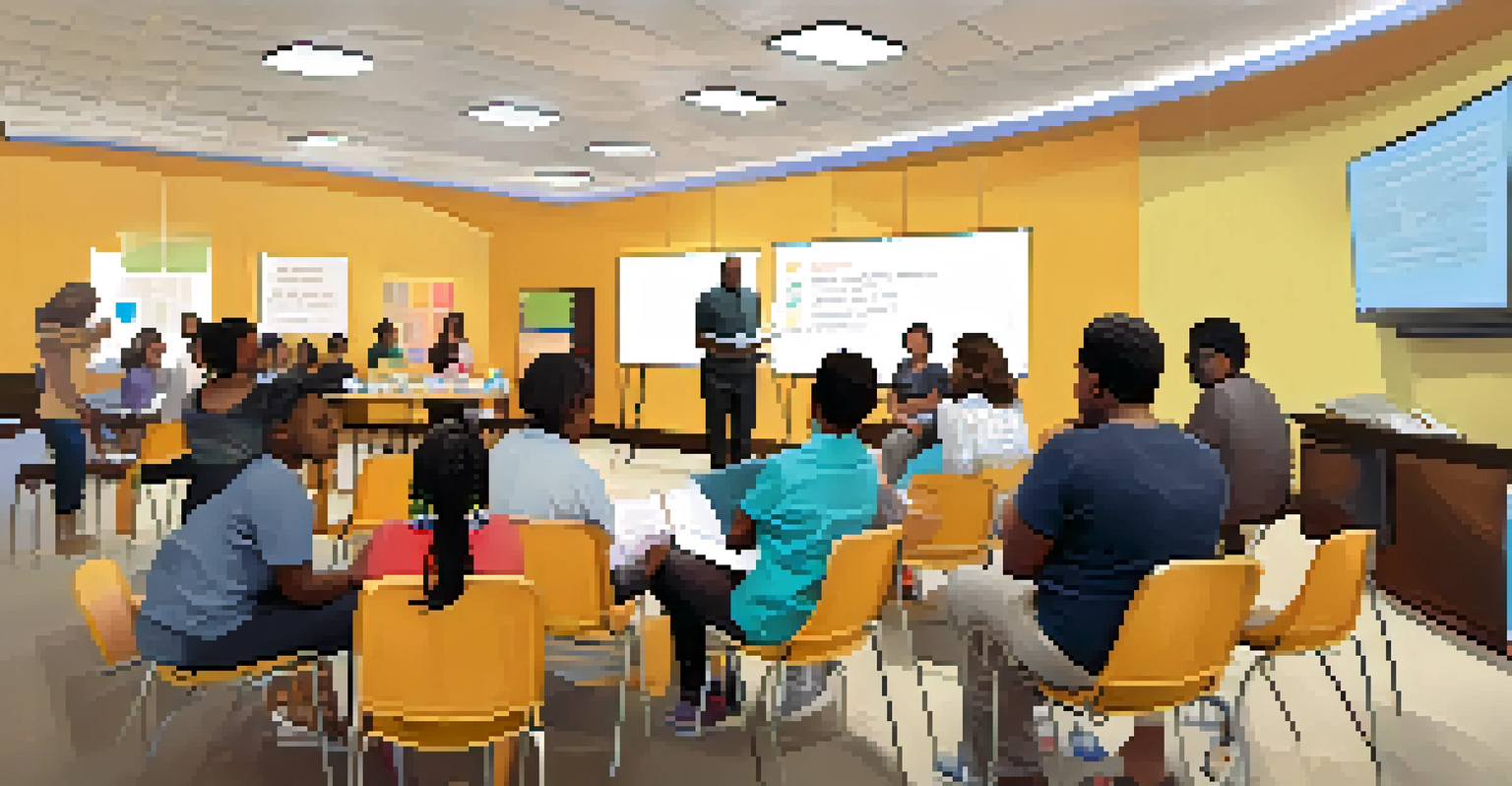Parental Involvement in New York State's Education System

Understanding Parental Involvement in Education
Parental involvement refers to the active participation of parents in their children's education, which can significantly impact their academic success. In New York State, this involvement can take many forms, from attending school meetings to helping with homework. It’s essential for parents to understand how their engagement can foster a more supportive learning environment for their children.
The greatest gift you can give your children is your time.
Studies have shown that students with involved parents tend to perform better academically and exhibit improved behavior. For instance, children whose parents are engaged often have higher grades and test scores. This positive correlation emphasizes the need for active parental participation in schools and their children's learning processes.
Moreover, parental involvement helps create a stronger connection between families and schools, fostering a sense of community. When parents collaborate with educators, they not only support their children but also contribute to the overall development of the school environment.
The Importance of Communication Between Parents and Schools
Effective communication is a cornerstone of successful parental involvement. Schools in New York State encourage open lines of communication through various channels, such as newsletters, parent-teacher conferences, and online platforms. By staying informed about school events and their children's progress, parents can better support their academic journeys.

Additionally, when parents communicate regularly with teachers, it creates a partnership that benefits students. For example, if a parent notices a change in their child's behavior, sharing this information with the teacher can lead to early interventions and support. This collaborative approach not only enhances student learning but also builds trust between parents and educators.
Parental Involvement Boosts Success
Active parental participation significantly enhances children's academic performance and overall behavior.
Moreover, schools that prioritize communication often see higher levels of parental involvement. When parents feel welcomed and valued, they are more likely to participate actively in school activities and initiatives, further enriching the educational experience for their children.
Barriers to Parental Involvement in New York
Despite the benefits, many parents face barriers to becoming involved in their children's education. Time constraints, lack of resources, and language barriers can hinder participation. For working parents, juggling jobs and family responsibilities often leaves little room for school engagement.
Education is a partnership between parents and schools. When parents are involved, students achieve more, regardless of their socio-economic status.
Additionally, some parents may feel intimidated or disconnected from the school system, especially if they had negative experiences in their own educational journeys. This disconnect can prevent them from attending meetings or engaging with teachers, which can ultimately affect their child's educational outcomes.
Recognizing and addressing these barriers is crucial for schools aiming to promote parental involvement. By offering flexible meeting times, providing translation services, and actively reaching out to families, schools can create a more inclusive environment for all parents.
Programs Supporting Parental Engagement in New York
New York State has implemented several programs aimed at enhancing parental involvement in education. Initiatives like the Parent Engagement Program focus on providing resources and training for parents to better support their children's education. These programs often include workshops on academic skills, communication strategies, and fostering a positive home environment for learning.
Schools also frequently organize events that encourage parental participation, such as family nights, open houses, and volunteer opportunities. These events not only allow parents to connect with teachers and staff but also foster a sense of community among families. By participating in these activities, parents can gain valuable insights into the school's culture and curriculum.
Communication is Key to Engagement
Effective communication between parents and schools fosters a strong partnership that supports student learning.
Moreover, technology plays a significant role in supporting parental engagement. Many schools in New York use online portals that allow parents to track their children's progress, communicate with teachers, and access educational resources. This digital accessibility empowers parents to take an active role in their children's education, regardless of their schedules.
The Role of Community Organizations in Education
Community organizations play a vital role in supporting parental involvement in education. Many local groups offer programs and resources designed to empower families and promote engagement. For instance, organizations may provide workshops on helping children with homework or navigating the school system.
These community initiatives often serve as a bridge between schools and families, facilitating communication and collaboration. By partnering with schools, community organizations can help parents feel more connected and informed about their children's education. This partnership can lead to a more supportive atmosphere for students.
Furthermore, community organizations can advocate for policies that enhance parental engagement at the district and state levels. By voicing the needs and concerns of families, these groups can help shape educational policies that foster a more inclusive and supportive education system.
The Impact of Cultural Diversity on Parental Involvement
New York State's rich cultural diversity presents both opportunities and challenges for parental involvement in education. Families from various backgrounds bring unique perspectives and experiences, which can enrich the school community. However, cultural differences can also lead to misunderstandings or hesitations around engagement.
For example, some immigrant families may not be familiar with the American education system or may face language barriers that prevent them from fully participating in school activities. Schools must recognize these challenges and work to create inclusive environments that embrace all cultural backgrounds. This may involve offering multilingual resources or culturally relevant programs.
Overcoming Barriers to Involvement
Addressing barriers such as time constraints and language differences is essential for increasing parental engagement in education.
By fostering an understanding of and respect for cultural diversity, schools can enhance parental involvement. When all families feel valued and included, they are more likely to engage with educators and participate in their children's education, ultimately benefiting everyone involved.
Future Directions for Parental Involvement in New York Education
Looking ahead, there is a growing recognition of the need for innovative strategies to enhance parental involvement in New York's education system. As schools continue to adapt to changing demographics and technologies, they must prioritize inclusive practices that engage all families. This may include leveraging social media and online platforms to reach parents where they are most comfortable.
Additionally, ongoing training for educators on the importance of family engagement can help build a more supportive school culture. When teachers understand the value of involving parents and are equipped with strategies to facilitate this, it can lead to stronger partnerships and better outcomes for students.

Ultimately, the future of parental involvement in New York's education system hinges on collaboration between schools, families, and community organizations. By working together, all stakeholders can create an environment where every child has the opportunity to succeed, reinforcing the vital role that parental involvement plays in education.